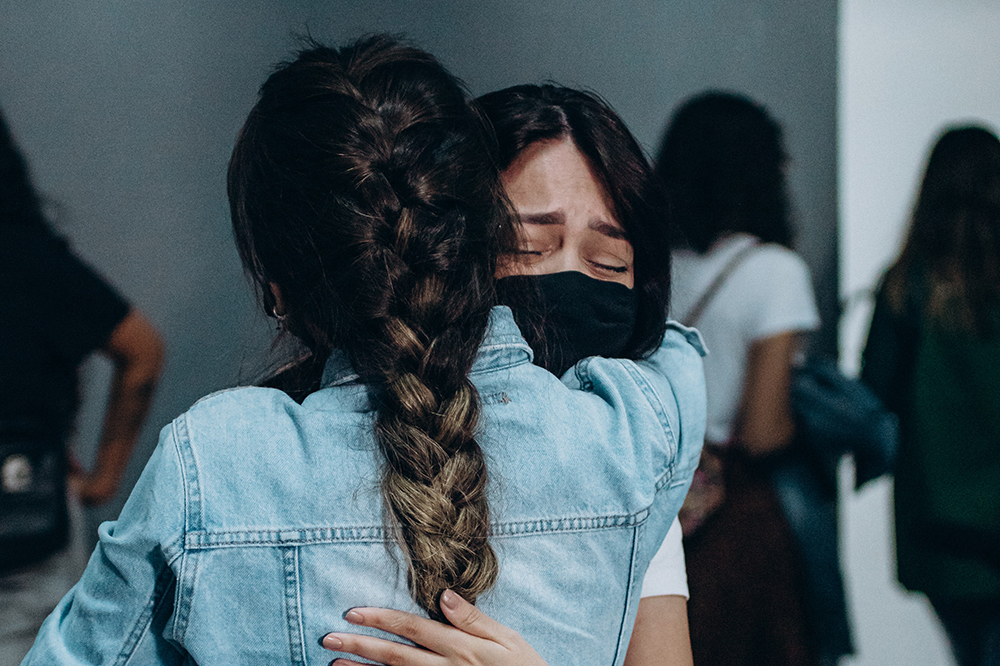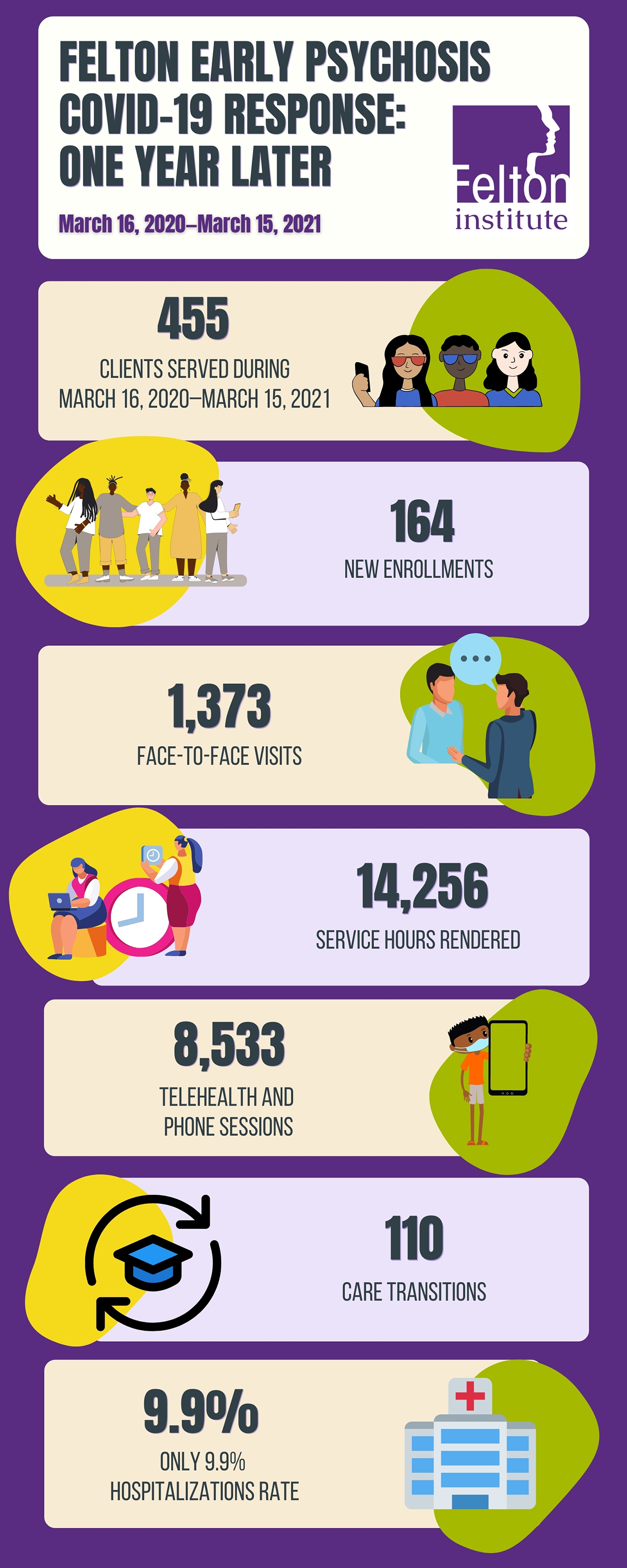This past year of COVID-19 generated high stress and anxiety for all, and the population battling early psychosis was even more vulnerable. Division Director Adriana Furuzawa explains, “We needed to have a good system in place so that we would not have to stop accepting new clients. And we had to do it with more demanding protocols.” So even during COVID-19, Felton continued to accept new enrollments or as Furuzawa expressed “welcoming new folks into treatment, into the teams, understanding that there would be other challenges.”

Felton Institute’s Early Psychosis Division treats people, most often in their teens or twenties, who have recently begun to experience feelings of a break from reality. Often this age group called Transitional Aged Youth (TAY) can be challenging to maintain contact with, as acknowledged by Adriana. However, during the past year, with nearly everyone staying at home, the Early Psychosis team maintained 100% consumer contact.
The Early Psychosis team of about 40 staff operates across five sites in Alameda, Marin, Monterey, San Francisco, and San Mateo, ranging from teams of three to five at some sites, with other sites having eight to 10 people. Addressing COVID-19 complications, teams developed a clear protocol to identify and prioritize in-person visits with the primary goal of preventing psychiatric hospitalizations or crisis events that would lead to someone who was not living in congregate settings, to require placement in a congregate setting during the pandemic.
The Early Psychosis team adopted a “whatever it takes approach” for meeting clients for therapy sessions wherever in the community the person was comfortable, whether at an ice cream shop or in the park.
“We meet somewhere where we could both have a private and personal engagement,” Furuzawa said. Her teams’ focus was to assist clients “without running around in circles, really talking and teaching skills to deal with voices that they’re the only ones who hear; seeing what others don’t; or a certain way of thinking that other folks don’t quite follow or understand. It requires understanding experiences unique to them, extreme fear and anxiety, in other words, what paranoia really is.”
The teams also worked to prepare everyone interested in receiving the COVID-19 vaccine as its availability became available to the TAY population age group. “We have been successful in supporting all of the counties with their educational campaigns and supporting families, including families whose primary language is not English or families that have a different experience as a community and have good reasons to not trust the process or trust institutions,” said Division Director Furuzawa.
Understanding Schizophrenia
Schizophrenia is considered one of the most severe and devasting diagnosis in the mental health field. Furuzawa explains how it impacts a person’s life as well as the stereotypes others have of people with schizophrenia. Though the field of studying schizophrenia has been strong for the last 25 years, there is no one blueprint that works for everybody. Treatment relates to the individual differences among people. Still, she shared her positive outlook, “But we know there are a number of resources that we can combine, and it’s that combination that will work out for many people.”
Early Detection
The early psychosis program mission is to make sure that every young person, as they are experiencing the very early signs and symptoms that a psychotic disorder like schizophrenia is developing, can receive treatment.
“Depending on how early you catch those very early warning signs, even if the person already has, as I like to say, crossed the threshold into a diagnosis of schizophrenia, that we can stop it in its tracks,” Furuzawa emphasized.
At the early stages, the individual may begin seeing relationships differently and then something happens. A signal of a psychotic disorder for a young person may be that they start not to do well in school, when they were previously doing well. They start to isolate more. The family or the school personnel may notice these changes.
The Division Director Furuzawa identified the challenge this produces, “It’s no different from anything else that can be happening in adolescence. So, you just don’t know.”
Inspiration from the Team Approach
The Early Psychosis team connection starts with rigorous assessments. It is not uncommon for the family to think the hopes and dreams for their young person must drastically change as a result of this diagnosis. Sharing their experiences, the team can be inspiring. Adrianna Furuzawa’s teams counsel, “By engaging in services like ours, we can show many different situations where that was not the case. And we can also say that it’s not going to be easy, but that it’s not impossible. It requires hard work on the part of everybody. So, let’s get to it.”
She compares early psychosis to a diagnosis of hypertension or diabetes where care providers have a clear idea of everything that the person needs to do so they can keep it under control and prevent serious side effects or serious illness due to complications.
“We have very good resources to prevent schizophrenia from becoming severe and debilitating,” Furuzawa said.
Felton’s early psychosis team is more than mental health professionals. It is also made up of individuals who have personal experience of psychotic or mood disorder; that had symptoms of psychosis; individuals who have cared for their loved ones who experienced psychosis; and individuals who are thinking of developing a mental health career. It is a rock star team.
Felton Institute Hosted Dr. Robert Heinssen for an Early Psychosis Mental Health Town Hall in 2019:

For more information about Felton’s Early Psychosis Programs, please visit feltonearlypsychosis.org.
About Felton Institute: Founded in 1889, Felton Institute responds to human needs by providing cutting edge, evidence-based mental health and social services that transform lives. Felton Institute is a tax-exempt organization registered 501(c)(3) nonprofit under EIN 94-1156530.
Offering more than 50 acclaimed and honored programs that address homelessness, mental health, prenatal, adolescent, adult, and senior needs, Felton Institute provides services in San Francisco, Alameda, San Mateo, Marin, and Monterey counties. Felton’s social services and programs utilize the latest scientific research, combining cultural sensitivity, deep respect for client and staff, and a commitment to social justice.
Felton is the oldest non-sectarian and nonprofit social services provider in the City and County of San Francisco. For over a century, Felton Institute has been at the forefront of social service innovation, pioneering new approaches to meet underserved populations’ emerging needs. At the heart of our work is the belief that individuals and families in crisis must have access to services and resources to help them build on their inherent strengths and develop self-sufficiency. www.felton.org
